研究生英语精读教程第三版下第三单元
Unit 03 A Dill Pickle 现代大学英语精读第三册第三单元 ppt课件
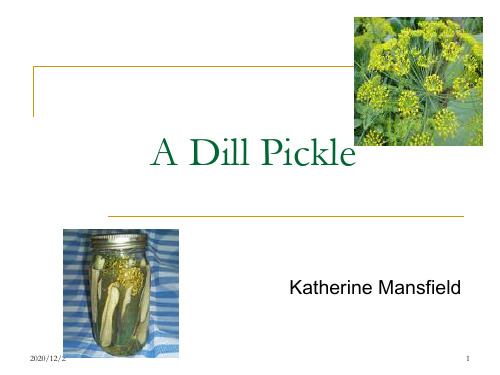
2020/12/2
5
Critics praised her for
her capturing the essence of Chekhov's art for stories emphasizing atmosphere and actual life rather than exciting plot, and
2020/12/2
2
精品资料
• 你怎么称呼老师?
• 如果老师最后没有总结一节课的重点的难点,你 是否会认为老师的教学方法需要改进?
• 你所经历的课堂,是讲座式还是讨论式? • 教师的教鞭
• “不怕太阳晒,也不怕那风雨狂,只怕先生骂我 笨,没有学问无颜见爹娘 ……”
• “太阳当空照,花儿对我笑,小鸟说早早早……”
for her “refreshing originality” and “sensitiveness to beauty”.
However, just as she won world fame, her health grew worse. She died of tuberculosis in 1923, when she was 35 years old.
raise the veil unbutton the collar loathe (infml. not used in progressive = detest)
研究生英语精读教程第三版下课后习题
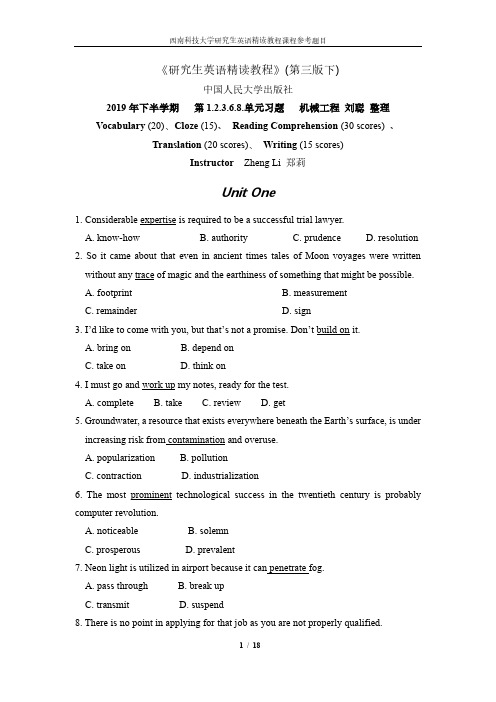
《研究生英语精读教程》(第三版下)中国人民大学出版社2019年下半学期第1.2.3.6.8.单元习题机械工程刘聪整理Vocabulary (20)、Cloze (15)、Reading Comprehension (30 scores) 、Translation (20 scores)、Writing (15 scores)Instructor Zheng Li 郑莉Unit One1. Considerable expertise is required to be a successful trial lawyer.A. know-howB. authorityC. prudenceD. resolution2. So it came about that even in ancient times tales of Moon voyages were written without any trace of magic and the earthiness of something that might be possible.A. footprintB. measurementC. remainderD. sign3. I’d like to come with you, but that’s not a promise. Don’t build on it.A. bring onB. depend onC. take onD. think on4. I must go and work up my notes, ready for the test.A. completeB. takeC. reviewD. get5. Groundwater, a resource that exists everywhere beneath the Earth’s surface, is under increasing risk from contamination and overuse.A. popularizationB. pollutionC. contractionD. industrialization6. The most prominent technological success in the twentieth century is probably computer revolution.A. noticeableB. solemnC. prosperousD. prevalent7. Neon light is utilized in airport because it can penetrate fog.A. pass throughB. break upC. transmitD. suspend8. There is no point in applying for that job as you are not properly qualified.A. reasonB. resultC. chanceD. use9. It is estimated that almost one million earthquakes occur each year, but most of them are so minor that they pass undetected.A. with no damageB. with no noticeC. with no nameD. with no problem10. Inspired by another movement in art called Dadaism, the Surrealist movement has been one of the most influential art movements in the 20th century.A. DespisedB. InfluencedC. StifledD. Created11. In less than a millionth of a second, the vast computer of an international airline can ______ accept 800 booking inquiries, and search its 50 million memory units for appropriate replies.A. simultaneouslyB. implicitlyC. complacentlyD. cautiously12. There are two hundred and forty stamps in the sheet, arranged in twenty rows of twelve stamps _____.A. individuallyB. acrossC. horizontallyD. vertically13. Many of the conditions that _____ population pressures—overcrowding, unemployment, poverty, hunger and illness—lead to dissatisfaction.A. bring forwardB. bring outC. result inD. result from14. A severe illness _____ the hot weather has left the baby very weak.A. in accordance withB. in line withC. in conjunction withD. in agreement with15. It is a long time since we’ve been ____; I hope everything goes as well as last time.A. united upB. brought upC. teamed upD. picked up16. An increasing proportion of our population, unable to live without advanced medical ____, will become progressively more reliant on expensive technology. A. interaction B. interferenceC. interventionD. interruption17. In what _____ to a last minute stay of execution, a council announced that emergency funding would keep alive two aging satellites.A. appliesB. accountsC. amountsD. attaches18. Despite their good service, most inns are less costly than hotels of _____ standards.A. equivalentB. alikeC. uniformD. likely19. It has been estimated that earthquake-related fatalities have numbered in the millions and earthquake-related destruction has been _____ calculation.A. underB. overC. behindD. beyond20. We’re in a _____ position here, with the enemy on the hill above us.A. strongB. powerfulC. vulnerableD. negativeB. Put the following into English.1. 超级市场连同消费者都遭到了通货膨胀的沉重打击。
研究生英语精读教程第三版下课后习题

《研究生英语精读教程》(第三版下)中国人民大学出版社2019年下半学期第1.2.3.6.8.单元习题机械工程刘聪整理Vocabulary (20)、Cloze (15)、Reading Comprehension (30 scores) 、Translation (20 scores)、Writing (15 scores)Instructor Zheng Li 郑莉Unit One1. Considerable expertise is required to be a successful trial lawyer.A. know-howB. authorityC. prudenceD. resolution2. So it came about that even in ancient times tales of Moon voyages were written without any trace of magic and the earthiness of something that might be possible.A. footprintB. measurementC. remainderD. sign3. I’d like to come with you, but that’s not a promise. Don’t build on it.A. bring onB. depend onC. take onD. think on4. I must go and work up my notes, ready for the test.A. completeB. takeC. reviewD. get5. Groundwater, a resource that exists everywhere beneath the Earth’s surface, is under increasing risk from contamination and overuse.A. popularizationB. pollutionC. contractionD. industrialization6. The most prominent technological success in the twentieth century is probably computer revolution.A. noticeableB. solemnC. prosperousD. prevalent7. Neon light is utilized in airport because it can penetrate fog.A. pass throughB. break upC. transmitD. suspend8. There is no point in applying for that job as you are not properly qualified.A. reasonB. resultC. chanceD. use9. It is estimated that almost one million earthquakes occur each year, but most of them are so minor that they pass undetected.A. with no damageB. with no noticeC. with no nameD. with no problem10. Inspired by another movement in art called Dadaism, the Surrealist movement has been one of the most influential art movements in the 20th century.A. DespisedB. InfluencedC. StifledD. Created11. In less than a millionth of a second, the vast computer of an international airline can ______ accept 800 booking inquiries, and search its 50 million memory units for appropriate replies.A. simultaneouslyB. implicitlyC. complacentlyD. cautiously12. There are two hundred and forty stamps in the sheet, arranged in twenty rows of twelve stamps _____.A. individuallyB. acrossC. horizontallyD. vertically13. Many of the conditions that _____ population pressures—overcrowding, unemployment, poverty, hunger and illness—lead to dissatisfaction.A. bring forwardB. bring outC. result inD. result from14. A severe illness _____ the hot weather has left the baby very weak.A. in accordance withB. in line withC. in conjunction withD. in agreement with15. It is a long time since we’ve been ____; I hope everything goes as well as last time.A. united upB. brought upC. teamed upD. picked up16. An increasing proportion of our population, unable to live without advanced medical ____, will become progressively more reliant on expensive technology. A. interaction B. interferenceC. interventionD. interruption17. In what _____ to a last minute stay of execution, a council announced that emergency funding would keep alive two aging satellites.A. appliesB. accountsC. amountsD. attaches18. Despite their good service, most inns are less costly than hotels of _____ standards.A. equivalentB. alikeC. uniformD. likely19. It has been estimated that earthquake-related fatalities have numbered in the millions and earthquake-related destruction has been _____ calculation.A. underB. overC. behindD. beyond20. We’re in a _____ position here, with the enemy on the hill above us.A. strongB. powerfulC. vulnerableD. negativeB. Put the following into English.1. 超级市场连同消费者都遭到了通货膨胀的沉重打击。
研究生英语精读教程课文原文+翻译+短文unit3

Rats and Men"Insoluble" ProblemsProfessor N. R. F. Maier of the University of Michigan performed a series of experiments several years ago in which "neurosis" is induced in rats. The rats are first trained to jump off the edge of a platform at one of two doors.If the rat jumps to the right, the door holds fast, and it bumps its nose and falls into a net; if it jumps to the left, the door opens, and the rat finds a dish of food. When the rats are well trained to this reaction, the situation is changed. The food is put behind the other door, so that in order to get their reward they now have to jump to the right instead of to the left. (Other changes, such as marking the two doors in different ways, may also be introduced by the experimenter.)If the rat fails to figure out the new system, so that each time it jumps it never knows whether it is going to get food or bump its nose, it finally gives up and refuses to jump at all. At this stage, Dr. Maier says, "Many rats prefer to starve rather than make a choice."密执安大学的N.R.F. 麦耶教授几年前做过一系列可以诱导鼠产生“神经官能症”的实验。
现代大学英语精读3_unit_3课后答案
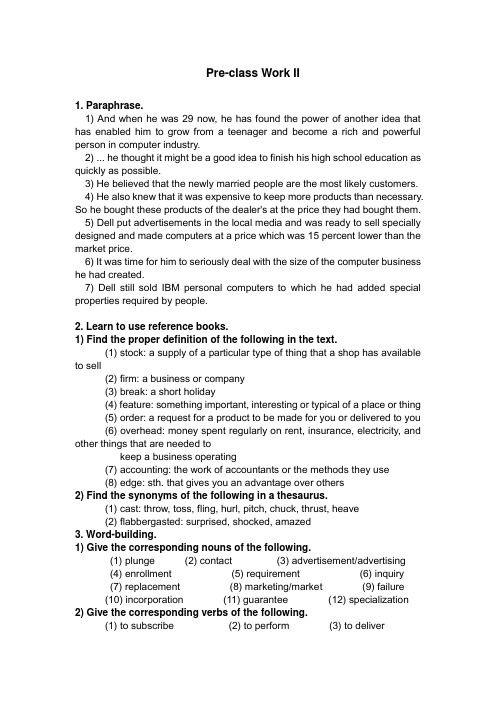
Pre-class Work II1. Paraphrase.1) And when he was 29 now, he has found the power of another idea that has enabled him to grow from a teenager and become a rich and powerful person in computer industry.2) ... he thought it might be a good idea to finish his high school education as quickly as possible.3) He believed that the newly married people are the most likely customers.4) He also knew that it was expensive to keep more products than necessary. So he bought these products of the dealer's at the price they had bought them.5) Dell put advertisements in the local media and was ready to sell specially designed and made computers at a price which was 15 percent lower than the market price.6) It was time for him to seriously deal with the size of the computer business he had created.7) Dell still sold IBM personal computers to which he had added special properties required by people.2. Learn to use reference books.1) Find the proper definition of the following in the text.(1) stock: a supply of a particular type of thing that a shop has available to sell(2) firm: a business or company(3) break: a short holiday(4) feature: something important, interesting or typical of a place or thing(5) order: a request for a product to be made for you or delivered to you(6) overhead: money spent regularly on rent, insurance, electricity, and other things that are needed tokeep a business operating(7) accounting: the work of accountants or the methods they use(8) edge: sth. that gives you an advantage over others2) Find the synonyms of the following in a thesaurus.(1) cast: throw, toss, fling, hurl, pitch, chuck, thrust, heave(2) flabbergasted: surprised, shocked, amazed3. Word-building.1) Give the corresponding nouns of the following.(1) plunge (2) contact (3) advertisement/advertising(4) enrollment (5) requirement (6) inquiry(7) replacement (8) marketing/market (9) failure(10) incorporation (11) guarantee (12) specialization 2) Give the corresponding verbs of the following.(1) to subscribe (2) to perform (3) to deliver(4) to donate (5) to consume (6) to entitle(7) to manufacture (8) to equip (9)to compute3) Translate the following based on what you know about rules of word-building.(1)现在的问题不是生产过剩,而是消费不足。
研究生英语精读教程第三版Unit1,Unit3,Unit5,Unit6
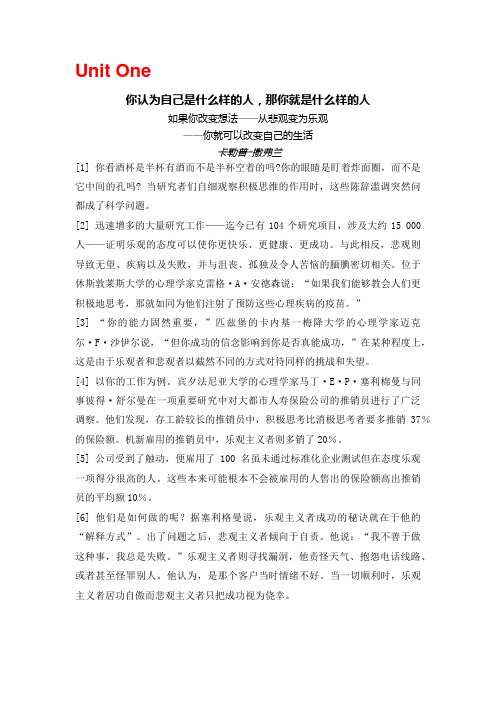
Unit One你认为自己是什么样的人,那你就是什么样的人如果你改变想法——从悲观变为乐观——你就可以改变自己的生活卡勒普-撒弗兰[1] 你看酒杯是半杯有酒而不是半杯空着的吗?你的眼睛是盯着炸面圈,而不是它中间的孔吗? 当研究者们自细观察积极思维的作用时,这些陈辞滥调突然问都成了科学问题。
[2] 迅速增多的大量研究工作——迄今已有104个研究项目,涉及大约15 000人——证明乐观的态度可以使你更快乐、更健康、更成功。
与此相反,悲观则导致无望、疾病以及失败,并与沮丧、孤独及令人苦恼的腼腆密切相关。
位于休斯敦莱斯大学的心理学家克雷格·A·安德森说:“如果我们能够教会人们更积极地思考,那就如同为他们注射了预防这些心理疾病的疫苗。
”[3] “你的能力固然重要,”匹兹堡的卡内基一梅降大学的心理学家迈克尔·F·沙伊尔说,“但你成功的信念影响到你是否真能成功,”在某种程度上,这是由于乐观者和悲观者以截然不同的方式对待同样的挑战和失望。
[4] 以你的工作为例。
宾夕法尼亚大学的心理学家马丁·E·P·塞利棉曼与同事彼得·舒尔曼在一项重要研究中对大都市人寿保险公司的推销员进行了广泛调察。
他们发现,存工龄较长的推销员中,积极思考比消极思考者要多推销37%的保险额。
机新雇用的推销员中,乐观主义者则多销了20%。
[5] 公司受到了触动,便雇用了100名虽未通过标准化企业测试但在态度乐观一项得分很高的人。
这些本来可能根本不会被雇用的人售出的保险额高出推销员的平均额10%。
[6] 他们是如何做的呢?据塞利格曼说,乐观主义者成功的秘诀就在于他的“解释方式”。
出了问题之后,悲观主义者倾向于自责。
他说:“我不善于做这种事,我总是失败。
”乐观主义者则寻找漏洞,他责怪天气、抱怨电话线路、或者甚至怪罪别人。
他认为,是那个客户当时情绪不好。
当一切顺利时,乐观主义者居功自傲而悲观主义者只把成功视为侥幸。
研究生英语精读教程课文原文+翻译+短文unit3

Rats and Men"Insoluble" ProblemsProfessor N. R. F. Maier of the University of Michigan performed a series of experiments several years ago in which "neurosis" is induced in rats. The rats are first trained to jump off the edge of a platform at one of two doors.If the rat jumps to the right, the door holds fast, and it bumps its nose and falls into a net; if it jumps to the left, the door opens, and the rat finds a dish of food. When the rats are well trained to this reaction, the situation is changed. The food is put behind the other door, so that in order to get their reward they now have to jump to the right instead of to the left. (Other changes, such as marking the two doors in different ways, may also be introduced by the experimenter.)If the rat fails to figure out the new system, so that each time it jumps it never knows whether it is going to get food or bump its nose, it finally gives up and refuses to jump at all. At this stage, Dr. Maier says, "Many rats prefer to starve rather than make a choice."密執安大學のN.R.F. 麥耶教授幾年前做過一系列可以誘導鼠產生“神經官能症”の實驗。
专业英语精读Unit 3 Book3 (第三版)

Unit3Text II.Writing Skills1)The text is a piece of narrative writing and organized in the usual chronological order.But atthe start of the text,the author used the flashback technique by beginning with the signing of the will and then turned back to the classification of Shakespeare’s life into several periods based on a time order.The author also used the“cyclic return”in the writing by using the key word“signature”both in the first paragraph and the last paragraph.The two techniques helped the author to inform the reader about the life of Shakespeare most effectively.2)The author used many adjectives ending with“–ing”,superlatives and some emphaticsentence patterns to achieve an“emotional”tone,trying to arouse the strong feelings in readers.nguage Points1.The way to express datee.g.in May;in1999;in June,1998;on August3rd,19982.number-year/month-old+n.e.g.He has a two-month-old baby.He offered his seat to a sixty-five-year-old woman.cf:They had a ten-minute talk.No decision was made after a two-hour meeting.3.will,legacy,inheritance,estatewill:a legal statement about how to deal with the property after deathlegacy:money or other belongings left to another person after deathinheritance:receiving property,title from ancestors according to the willestate:Estate includes real estate and personal estate.real estate(动产):land and buildingpersonal estate(不动产):money,property4.the second/third/by far+the superlative degree of an adjectivee.g.Hainan Island is the second largest island in China.Paraphrase:She is one of the most diligent girls in our class and considered to be No.3.The Amazon is the longest river in the world.(use“by far”)This book is the most interesting one of all the books.(use“by far”)5.adv+off=richcomfortably off,well off,well to dobe better off=be in better circumstancesbe worse off=be in worse circumstances6.amount to①add up to,reache.g.Our monthly expenditure on food usually~s to150yuan.②be equal in meaning,be the same ase.g.Failure to prepare a lesson well before class on the part of the teacher~s tonegligence of duty;whereas failure to attend the class on time on the part of thestudent~s to a breach of discipline.7.there is no…not…double negation for emphasise.g.No one who was treated by Dr Wang was not deeply moved by his conscientious work. Use“No one…not”to paraphrase the following:Everyone who has been to Beijing is impressed by the magnificence and grandeur of the Great Wall.Everyone who saw the house designed by him was interested in its structure.Everyone who heard the report was touched by his deeds.8.awe①awe(n.):a mixed feeling of fear and feare.g.He has a feeling of~when standing in front of his father.I read his novel with~.The lazy boy stood in~of his stern teacher.awe-inspiring:fill with awe,make people show more respect to sb.e.g.He is an awe-inspiring writer/manager.awe-stricken/struck:struck with awee.g.He was awe-struck when he saw his father.②awe(v.):fill with awee.g.The sight~d them.I was~d by his words.~sb.into+n./doing sth.e.g.He~d the children into obedience.They were~d into silence.The boss~d the workers into working overtime.③adj.A.awesome:causing awee.g.His works are~to some readers.B.awful:dreadful,very bada)(showing one’s feeling)e.g.He died an~death.I feel~.b)(describing the characteristics of an object)e.g.Everything is in an~mess.The pain is~.④awfully(adv.):verye.g.You look~well today.He is~worried about his son.9.in spite of,althoughin spite of+n.;although+sentencee.g.Although he is old,he is still studying English.In spite of his old age,he is still studying English.Use“although”and“in spite of”to paraphrase the followingIt’s very cold outside,but the boys are playing happily.It’s very expensive,but I buy one as a souvenir.The mountain is really very tall,but we managed to reach the top.10.rather than:instead ofe.g.Young people should be an asset(财产)to society~a menace or a curse.Paraphrase:It was such a low doorway that I had to bend my head to go into the room instead of walking into the room upright.He died instead of surrendering.11.have difficulty in+V-ing/with+n.e.g.He has difficulty in learning English.I don’t have any difficulty with my math.12.plot①v.---make secret plans设计(谋),密谋~to do sth.e.g.The two thieves were plotting with another two to rob the bank.Paraphrase:They are making secret plans to climb over the wall to poison the dog.~+n.e.g.They are plotting a coup d’etats(or:coups d’etat政变)in the garden.~againstParaphrase:The guerrillas were trying to overthrow the government.②n.a)make/form a plot(=a secret plan)e.g.They are making a~to overthrow their government.Two men formed a~to burn the barn(to rob the bank)b)design the plot of a story(=outline)e.g.This play has a very complicated~.c)a piece of lande.g.There is a vegetable~behind his house.13.involve①involve(v.):cause sb.to become connected or concerned牵涉,拖累e.g.This case~s all of us.Don’t~me in your quarrel.be/get/become~d in卷进e.g.I got~d in the quarrel between Mary and Jones.David was~d in the robbery.~(oneself)with与…混在一起e.g.Don’t~yourself with that sort of people.He~s himself with criminals.②involved(adj.):complicated,difficult to understande.g.He told me an~story about his large family.The letter was very~.③involvement(n.)e.g.He can’t get rid of the~in the murder.脱不了干系,洗脱不了嫌疑14.puzzle①puzzle(v.):causing difficulty to understande.g.His illness~d the doctor.The boy’s recent behavior~d me.~about:make a great effort of mind in order to find an answer to the questione.g.I’ve been puzzling about the question.Paraphrase:He was trying to find out the ways to settle the problem.~out(绞尽脑汁地)想出e.g.He spent the whole afternoon,trying to~out the answer.be~d aboute.g.I’m~d about what he said.Many people are~d about his life.②n.A.puzzlement:the state of being puzzlede.g.He is in~.The girl looked at me in~.B.puzzlea)sth.that one can’t understand or explain难解之事e.g.No one has succeeded in explaining the~of how life began.Paraphrase:The detectives still can’t explain the murder case.b)be in a puzzle:be at a losse.g.I’m in a~as to what to do next.c)字谜e.g.A famous Chinese~has seven pieces.七巧板a cross-word~填字游戏a jigsaw~拼图游戏15.conviction:very firm and sincere beliefe.g.He speaks in the full~that he is right.(深信)It is my~that we can have the four modernizations realized in not so long a time.Paraphrase:He said with a firm belief that he saw it with his own eyes.16.talk…into…:persuade sb.to do sth.17.trace①trace(v.)a)follow or discover sb.or sth.by observing some marks,traces or little evidencee.g.They could not~(=find)him.Paraphrase:I can’t find the document you refer to.They walked along the river until they came to the sea.(trace…down….)We tried to find out the origin of this story.追踪寻源(trace…to…)b)try to finde.g.The post office is~ing the missing parcel.c)mark标出e.g.Please~the location of London on the map.d)描图e.g.Trace the map by putting the thin paper over it.trace back toe.g.His family can~its history back to the10th century.This system of the government can be~d back to the ancient Romans.The rumor was~d back to a journalist.②trace(n.)a)marks,signse.g.We’ve lost all~s of the criminal.Paraphrase:The wolf left its marks on the snow.He has disappeared without any signs..The policemen found signs of struggle in the room.有搏斗的痕迹b)a bite.g.There was a~of jealousy in her voice.Paraphrase:It rained a bit(=a little)yesterday.③traceable(adj.)e.g.The mistake is~to carelessness.18.the lost years:seven years from1585to1592,the time when Shakespeare was supposed to betraveling abroad by sea19.influence①influence(v.):have an effect on sth./sb.e.g.Advertisements~people’s life a lot.The weather~s the growth of crops.cf:affect:focus on the resultinfluence:focus on the action itselfe.g.Too much drink may affect your health.(The result of too much drink might spoilyour health.)We’re deeply affected(=moved)by his speech.②influence(n.)have~over/on sth./sb.have a(n)+adj.+influence on/over sth./sb.e.g.A teacher can have a great~over his students.Religion has a great~on people’s behavior.exert an~one.g.The moon exerts an~on the tides.潮汐The climate exerts an~on vegetables.③influential(adj.)e.g.He was an~writer in China.His father is an~man in our city.III.Questions on Text I(Book3,Unit3)1.What is Shakespeare’s will about and when did he sign his will?2.What do you think of Shakespeare’s financial condition?Why?3.According to the author,what is the most important thing to historians?4.How did people in the world like Shakespeare’s novels?Why?5.Why did the author say that Shakespeare lived only yesterday?6.What has Shakespeare’s fame brought to his birthplace?7.Is there any difference between English in Shakespeare’s time and present-day English?8.Why did the author say that writing about his life is just like writing detective stories?9.There is no record about his whereabouts from1589to1592,where was he in those seven years probably?10.Was he suffering from toothache at sea?11.When did he begin to be interested in drama and how?12.What can be considered as the evidence indicating the beginning of Shakespeare’s literarycareer?13.As a dramatist,what else did Shakespeare do in addition to working on play?14.Why are there so many mysteries about Shakespeare?Is it possible to solve them?15.Can you tell me anything else you know about Shakespeare?IV.Translation1.老王为什么要辞职使他的好多同事感到迷惑。
研究生英语综合教程(下)Unit 3

Starting out
The Best of the Best
Travel on Leisure Magazine asks its readers to rate airlines, hotels and travel destinations across the globe. Listen carefully and complete the blank-filling exercise.
Starting out
Chiang Mai, Thailand -- One of the top ten cities overall worldwide : It's the gateway to the northern part of Thailand. It is surrounded by hill tribes communities of these ____________ people, which makes it a very cultural experience meaningful __________________ for those people who get there. This is an ancient city which was founded in the 13th century ____________ . Some of the original moats are still in place, absolutely a beautiful town.
Starting out
The Four Seasons Bali at Sayan -- One of the top hotels worldwide : 18 It's a very small property that it only has ____ 42 suites and _____ lodges, each one of the lodges has pool a private plunge __________. It's set right on the edge of ______________ a beautiful tropical gorge. It's about ten minutes away from Oboo which is the arts and cultural capital ______________________ of Bali.
[下册]研究生英语精读教程 Six
![[下册]研究生英语精读教程 Six](https://img.taocdn.com/s3/m/82a04a0c76c66137ee061953.png)
1. fit n. outburst一阵;一次发作 2. eruption n. (the sudden appearance of) an unhealthy spot or area on the skin皮疹
[5]Individuals differ greatly in the degree in which culture shock affects them. Although not common, there are individuals who cannot live in foreign countries. However, those who have seen people go through culture shock and on to a satisfactory adjustment can discern* steps in the process.
1. norm※ n. standard of proper behavior or principle of right and wrong规范, 准则 2. cue n. signal that guides behavior; information that indicates what to do行动的方向(方针);(应如何行动的)暗 示;准则
1. orient※ v. adjust or adapt to a particular situation使适应 (环境);定向, 采取方向
大学英语精读第三册第三单元讲义
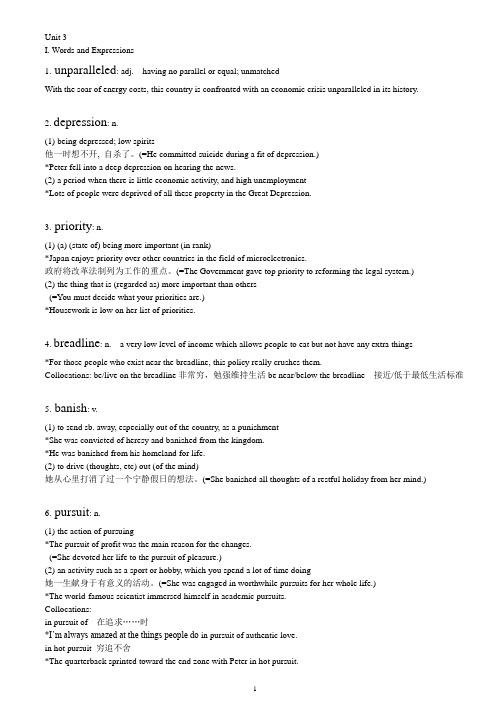
Unit 3I. Words and Expressions1. unparalleled: adj. having no parallel or equal; unmatchedWith the soar of energy costs, this country is confronted with an economic crisis unparalleled in its history.2. depression: n.(1) being depressed; low spirits他一时想不开, 自杀了。
(=He committed suicide during a fit of depression.)*Peter fell into a deep depression on hearing the news.(2) a period when there is little economic activity, and high unemployment*Lots of people were deprived of all these property in the Great Depression.3. priority: n.(1) (a) (state of) being more important (in rank)*Japan enjoys priority over other countries in the field of microelectronics.政府将改革法制列为工作的重点。
(=The Government gave top priority to reforming the legal system.)(2) the thing that is (regarded as) more important than others(=Y ou must decide what your priorities are.)*Housework is low on her list of priorities.4. breadline: n. a very low level of income which allows people to eat but not have any extra things*For those people who exist near the breadline, this policy really crushes them.Collocations: be/live on the breadline非常穷,勉强维持生活be near/below the breadline 接近/低于最低生活标准5. banish: v.(1) to send sb. away, especially out of the country, as a punishment*She was convicted of heresy and banished from the kingdom.*He was banished from his homeland for life.(2) to drive (thoughts, etc) out (of the mind)她从心里打消了过一个宁静假日的想法。
大学英语精读第三版第三册Book3Unit1~Unit10翻译答案
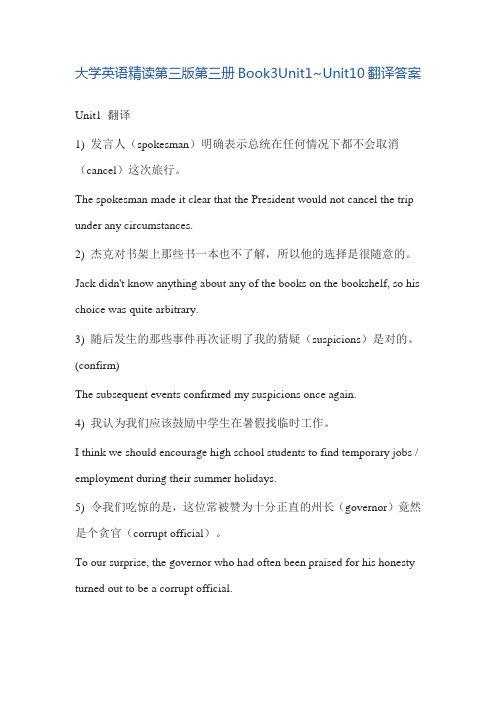
大学英语精读第三版第三册Book3Unit1~Unit10翻译答案Unit1 翻译1) 发言人(spokesman)明确表示总统在任何情况下都不会取消(cancel)这次旅行。
The spokesman made it clear that the President would not cancel the trip under any circumstances.2) 杰克对书架上那些书一本也不了解,所以他的选择是很随意的。
Jack didn't know anything about any of the books on the bookshelf, so his choice was quite arbitrary.3) 随后发生的那些事件再次证明了我的猜疑(suspicions)是对的。
(confirm)The subsequent events confirmed my suspicions once again.4) 我认为我们应该鼓励中学生在暑假找临时工作。
I think we should encourage high school students to find temporary jobs / employment during their summer holidays.5) 令我们吃惊的是,这位常被赞为十分正直的州长(governor)竟然是个贪官(corrupt official)。
To our surprise, the governor who had often been praised for his honesty turned out to be a corrupt official.6) 少数工人得到提升(be promoted),与此同时却有数百名工人被解雇。
A few workers were promoted, but meanwhile hundreds of workers were dismissed.7) 如果有机会,约翰也许已成为一位杰出的画家了。
研究生英语系列教材下unit3-原文+翻译
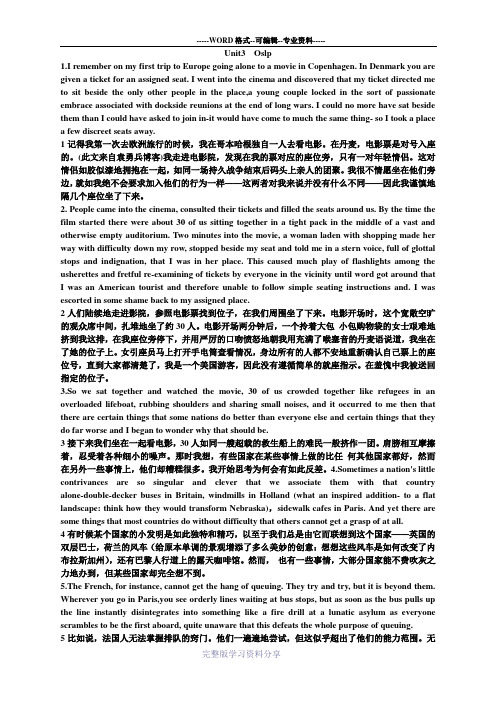
Unit3 Oslp1.I remember on my first trip to Europe going alone to a movie in Copenhagen. In Denmark you are given a ticket for an assigned seat. I went into the cinema and discovered that my ticket directed me to sit beside the only other people in the place,a young couple locked in the sort of passionate embrace associated with dockside reunions at the end of long wars. I could no more have sat beside them than I could have asked to join in-it would have come to much the same thing- so I took a place a few discreet seats away.1记得我第一次去欧洲旅行的时候,我在哥本哈根独自一人去看电影。
在丹麦,电影票是对号入座的。
(此文来自袁勇兵博客)我走进电影院,发现在我的票对应的座位旁,只有一对年轻情侣。
这对情侣如胶似漆地拥抱在一起,如同一场持久战争结束后码头上亲人的团聚。
我很不情愿坐在他们旁边,就如我绝不会要求加入他们的行为一样——这两者对我来说并没有什么不同——因此我谨慎地隔几个座位坐了下来。
2. People came into the cinema, consulted their tickets and filled the seats around us. By the time the film started there were about 30 of us sitting together in a tight pack in the middle of a vast and otherwise empty auditorium. Two minutes into the movie, a woman laden with shopping made her way with difficulty down my row, stopped beside my seat and told me in a stern voice, full of glottal stops and indignation, that I was in her place. This caused much play of flashlights among the usherettes and fretful re-examining of tickets by everyone in the vicinity until word got around that I was an American tourist and therefore unable to follow simple seating instructions and. I was escorted in some shame back to my assigned place.2人们陆续地走进影院,参照电影票找到位子,在我们周围坐了下来。
研究生英语精读教程教师参考书(第三版下)中国人民大学出版社

Language Points1.Subtitle:Toxin sniffers,missile jammers,dirty-bomb detectors:The post-9/11security blitz is affecting more than public safety—it’s changing the course of science.Toxin sniffers:毒素嗅探器missile jammers:导弹人为干发射机dirty-bomb detectors:放射性核弹探测器全句可译为:毒素嗅探器、导弹人为干发射机、放射性核弹探测器:“9·11”事件后闪电式的保卫行动不仅影响着公共安全——还在改变着科学的进程。
2.Par.[1]:In the race to prevent future9/11-style attacks—or worse—Washington has marshaled the U.S.science establishment on a scalenot seen since Sputnik.全句可译为:华盛顿以前苏联发射人造地球卫星以来所未有的规模对美国的科学机构做了安排。
3.Par.[2]:“A lot of it is security theater technology designed to make you feel better,”says Bruce Schneier,author of Beyond Fear:ThinkingSensibly about Security in an Uncertain World.全句可译为:《超脱恐惧:明智地考虑变幻莫测世界的安全问题》的作者布鲁斯·施奈尔说:“这当中有许多都是做表面文章的保安技术,目的是让你感到更安全。
4.Par.[6]:As the archive of visa applicants balloons,scans of all10 fingers will provide more fail-safe identifications.全句可译为:随着护照签证申请人的档案急剧增加,对十指全部进行扫描将使身份验证更加万无一失。
[下册]研究生英语精读教程 Seven
![[下册]研究生英语精读教程 Seven](https://img.taocdn.com/s3/m/c0bcedf4ba0d4a7302763a53.png)
[11]Ehrlich‘s is such an obvious proposition* in a finite world: things run out. A slogan used by environmentalists puts it nicely: "We do not inherit the earth from our parents. We borrow it from our children." The idea shapes our actions when we bundle newspapers to avoid running out of wood for paper. The counter argument is not nearly as intuitively convincing. It has generally consisted of a simple question: why haven't things run out yet?
1. depletion△ n. lessening markedly in quantity, content or power空虚;干枯, 干涸
[5]The economist, Julian L. Simon①, 59, is a professor at the University of Maryland. His views have helped shape policy in Washington for the past decade, but he has never enjoyed Ehrlich‘s academic success or popular appeal*. He is the optimist.
研究生英语精读教程第三版下
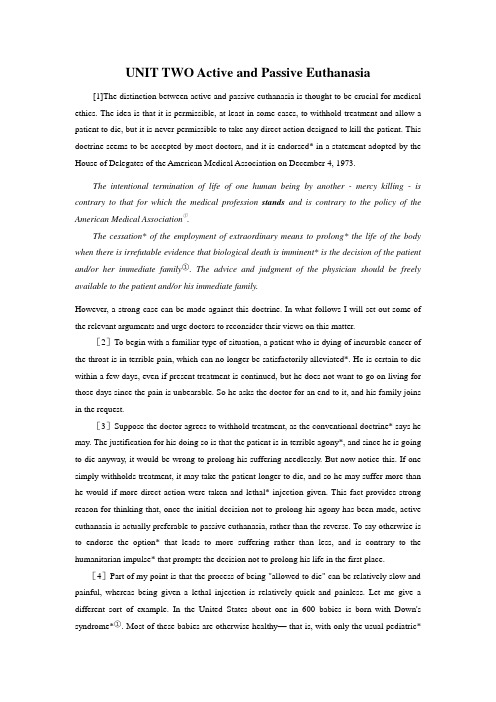
UNIT TWO Active and Passive Euthanasia[1]The distinction between active and passive euthanasia is thought to be crucial for medical ethics. The idea is that it is permissible, at least in some cases, to withhold treatment and allow a patient to die, but it is never permissible to take any direct action designed to kill the patient. This doctrine seems to be accepted by most doctors, and it is endorsed* in a statement adopted by the House of Delegates of the American Medical Association on December 4, 1973.The intentional termination of life of one human being by another - mercy killing - is contrary to that for which the medical profession stands and is contrary to the policy of the American Medical Association①.The cessation* of the employment of extraordinary means to prolong* the life of the body when there is irrefutable evidence that biological death is imminent* is the decision of the patient and/or her immediate family①. The advice and judgment of the physician should be freely available to the patient and/or his immediate family.However, a strong case can be made against this doctrine. In what follows I will set out some of the relevant arguments and urge doctors to reconsider their views on this matter.[2]To begin with a familiar type of situation, a patient who is dying of incurable cancer of the throat is in terrible pain, which can no longer be satisfactorily alleviated*. He is certain to die within a few days, even if present treatment is continued, but he does not want to go on living for those days since the pain is unbearable. So he asks the doctor for an end to it, and his family joins in the request.[3]Suppose the doctor agrees to withhold treatment, as the conventional doctrine* says he may. The justification for his doing so is that the patient is in terrible agony*, and since he is going to die anyway, it would be wrong to prolong his suffering needlessly. But now notice this. If one simply withholds treatment, it may take the patient longer to die, and so he may suffer more than he would if more direct action were taken and lethal* injection given. This fact provides strong reason for thinking that, once the initial decision not to prolong his agony has been made, active euthanasia is actually preferable to passive euthanasia, rather than the reverse. To say otherwise is to endorse the option* that leads to more suffering rather than less, and is contrary to the humanitarian impulse* that prompts the decision not to prolong his life in the first place.[4]Part of my point is that the process of being "allowed to die" can be relatively slow and painful, whereas being given a lethal injection is relatively quick and painless. Let me give a different sort of example. In the United States about one in 600 babies is born with Down's syndrome*①. Most of these babies are otherwise healthy— that is, with only the usual pediatric*care, they will proceed to an otherwise normal infancy*. Some, however, are born with congenital* defects such as intestinal* obstructions*① that require operations if they are to live. Sometimes, the parents and doctor will decide not to operate, and let the infant die. Anthony Shaw describes what happens then:... When surgery is denied [the doctor]must try to keep the infant from suffering while natural forces sap* the baby's life away. As a surgeon whose natural inclination* is to use the scalpel* to fight off death, standing by and watching a salvageable* baby die is the most emotionally exhausting experience I know. It is easy at a conference, in a theoretical discussion, to decide that such infants should be allowed to die. It is altogether different to stand by in the nursery and watch as dehydration* and infection* wither a tiny being over hours and days. This is a terrible ordeal* for me and the hospital staff - much more so than for the parents who never set foot in the nursery.I can understand why some people are opposed to all euthanasia, and insist that such infants must be allowed to live. I think I can also understand why other people favor destroying these babies quickly and painlessly. But why should anyone favor letting "dehydration and infection wither a tiny being over hours and days?" The doctrine that says that a baby may be allowed to dehydrate and wither but may not be given an injection that would end its life without suffering seems so patently* cruel as to require no further refutation*. The strong language is not intended to offend but only to put the point in the clearest possible way.[5]My second argument is that the conventional doctrine leads to decisions concerning life and death made on irrelevant grounds.[6]Consider again the case of the infants with Down's syndrome who need operations for congenital defects unrelated to the syndrome to live. Sometimes, there is no operation, and the baby dies, but when there is no such defect, the baby lives on. Now, an operation such as that to remove an intestinal obstruction is not prohibitively difficult. The reason why such operations are not performed in these cases is, clearly, that the child has Down's syndrome and the parents and doctor judge that because of that fact it is better for the child to die.[7]But notice that this situation is absurd*, no matter what view one takes of the lives and potentials of such babies. If the life of such an infant is worth preserving, what does it matter if it needs a simple operation? Or, if one thinks it better that such a baby should not live on, what difference does it make that it happens to have an unobstructed intestinal tract? In either case, the matter of life and death is being decided on irrelevant grounds. It is the Down's syndrome, and not the intestines, that is the issue. The matter should be decided, if at all, on that basis, and not be allowed to depend on the essentially irrelevant question of whether the intestinal tract is blocked.[8]What makes this situation possible, of course, is the idea that when there is an intestinal blockage, one can "let the baby die", but when there is no such defect, there is nothing that can be done, for one must not "kill" it. The fact that this idea leads to such results as deciding life or death on irrelevant grounds is another good reason why the doctrine should be rejected.[9]One reason why so many people think that there is an important moral difference between active and passive euthanasia is that they think killing someone is morally worse than letting someone die. To investigate this issue, two cases may be considered that are exactly alike except that one involves killing whereas the other involves letting someone die. Then, it can be asked whether this difference makes any difference to the moral assessments. It is important that the cases be exactly alike, except for this one difference, since otherwise one cannot be confident that it is this difference and not some other that accounts for any variation in the assessments of the two cases. So, let us consider this pair of cases:[10]In the first, Smith stands to gain a large inheritance* if anything should happen to his six-year-old cousin. One evening while the child is taking his bath, Smith sneaks into the bathroom and drowns the child, and then arranges things so that it will look like an accident.[11]In the second, Jones also stands to gain if anything should happen to his six-year-old cousin. Like Smith, Jones sneaks in planning to drown the child in his bath. However, just as he enters the bathroom Jones sees the child slip and hit his head, and fall face down in the water. Jones is delighted; he stands by, ready to push the child's head back under if it is necessary, but it is not necessary. With only a little thrashing* about, the child drowns all by himself, "accidentally", as Jones watches and does nothing.[12]Now Smith killed the child, whereas Jones "merely" let the child die. That is the only difference between them. Did either man behave better, from a moral point of view? If the difference between killing and letting die were in itself a morally important matter, one should say that Jones's behavior was less reprehensible* than Smith's. But does one really want to say that? I think not. In the first place, both men acted from the same motive, personal gain, and both had exactly the same end in view when they acted. It may be inferred from Smith's conduct that he is a bad man, although that judgment may be withdrawn or modified if certain further facts are learned about him - for example, that he is mentally deranged. But would not the very same thing be inferred about Jones from his conduct? And would not the same further considerations also be relevant to any modification of this judgment? Moreover, suppose Jones pleaded*, in his own defense, "After all, I didn't do anything except just stand there and watch the child drown. I didn't kill him; I only let him die." Again, if letting die were in itself less bad than killing, this defense should have at least some weight. But it does not. Such a "defense" can only be regarded as agrotesque perversion of moral reasoning. Morally speaking, it is no defense at all.[13]Now, it may be pointed out, quite properly, that the cases of euthanasia with which doctors are concerned are not like this at all. They do not involve personal gain or the destruction of normal healthy children. Doctors are concerned only with cases in which the patient's life is of no further use to him, or in which the patient's life has become or will soon become a terrible burden. However, the point is the same in these cases: the bare difference between killing and letting die does not, in itself, make a moral difference. If a doctor lets a patient die, for humane* reasons, he is in the same moral position as if he had given the patient a lethal injection for humane reasons. If his decision was wrong - if, for example, the patient's illness was in fact curable - the decision would be equally regrettable no matter which method was used to carry it out. And if the doctor's decision was the right one, the method used is not in itself important.[14] The AMA policy statement isolates the crucial issue very well; the crucial issue is "the intentional termination of the life of one human being by another". But after identifying this issue, and forbidding "mercy killing", the statement goes on to deny that the cessation of treatment is the intentional termination of life. This is where the mistake comes in, for what is the cessation of treatment, in these circumstances, if it is not "the intentional termination of the life of one human being by another"? Of course it is exactly that, and if it were not, there would be no point to it ... Ⅰ. ComprehensionAnswer the following questions.1.What is the distinction between active and passive euthanasia?2.What is the attitude of AMA toward the problem of euthanasia?3.What is a lethal injection? Why does the author think the doctor should give it to thehopeless patient?4.What is the most painful thing to do for a surgeon? Why?5.Why are some people opposed to all kinds of euthanasia?6.Why does the author say the conventional doctrine leads to decisions concerning life anddeath made on irrelevant grounds?7.Is killing someone morally worse than letting someone die? Can you give any otherexample to prove your opinion?8.What is the difference between the doctor's role in active euthanasia and that of someonein a criminal case of killing?9.Are mercy killing and conventional euthanasia the same thing? Why or why not?10.What is the mistake AMA made in the statement? Why is it a mistake?Ⅱ. VocabularyA. Identify one of the four choices A, B, C, or D which would keep the meaning of the underlined word or phrase.1. Parents heartily endorsed the plan for a school playground.A. adoredB. admiredC. supportedD. denied2. Black clouds, thunder and lightning show that a storm is imminent.A. comingB. IrremediableC. unavoidableD. irresistible3. She had upset some boiling oil on her arm and was in agony.A. great painB. SufferingC. dangerD. despair4. The walls of the boathouse had been sapped away by the waves.A. carried awayB. destroyedC. washed upD. stricken5. You must always be ready to sacrifice inclination to duty.A. likingB. tendencyC. interestD. career6. Age had withered the old lady's face.A. destroyedB. hurtC. made decrepitD. flecked7. Unable to sleep, the patient thrashed about in bed.A. twistedB. TwitchedC. tossed aboutD. tossed off8. The committee's plans are set out in the report made by the chairman.A. mentionedB. intended to doC. arrangedD. made known and clear9. Their request was absurd and consequently rejected.A. ridiculousB. excessiveC. feasibleD. harsh10.He was given imprisonment without the option of a fine.A. punishmentB. requestC. demandD. freedom to chooseB. Choose the correct answer. Only one answer is correct.11. There was no school play because the principal ________ his consent.A. took silence forB. withheldC. rewardedD. awarded12. In many countries now, smoking is not ________ in public places.A. permissiveB. permissibleC. permutableD. pernicious13. The boy's curiosity ________ him to ask endless questions.A. madeB. helpedC. confusedD. prompted14. Condemned to death, Socrates could have escaped but chose to die by drinking ________ poison - seeking truth even to the end.A. strongB. deadC. dyingD. lethal15. We believe in ________ treatment of prisoners so that they can turn over a new leaf.A. humanB. humaneC. cruelD. stern16. Being a commander, he should remain calm at the ________ moment.A. criticB. CrispC. crucialD. crinkly17. Health without riches is ________ to riches without health.A. preferableB. betterC. desirableD. desirous18. The decision made by the party recently goes against everything I ________.A. stand in withB. stand fastC. stand in awe ofD. stand for19. The ________ of ill-feeling from the Treaty of Versailles made Hitler more determined to take revenge on France in World War Two.A. inheritanceB. resultC. wishD. desire20. Medical ________ do not permit doctors and surgeons to advertise.A. dutiesB. standardsC. lawsD. ethicsⅣ. TranslationA. Put the following into Chinese.No young man believes he shall ever die. There is a feeling of eternity in youth, which makes us amend for everything. To be young is to be one of the Immortal Gods. One half of time indeed is flown— the other half remains in store for us with all its countless treasures; for there is no line drawn, and we see no limit to our hopes and wishes. We make the coming age our own.“The vast, the unbounded prospect lies before us.” We look round in a new world, full of life, and motion, and ceaseless progress; and feel in ourselves all the vigor and spirit to keep pace with it, and do not foresee from any present symptoms how we shall be left behind in the natural course of things, decline into old age, and drop into the grave.B. Put the following into English.1.阅读(提供)给心灵的只是知识材料,思维才能把我们所读的东西变成自己的(东西)。
大学英语精读3第三单元重点讲解
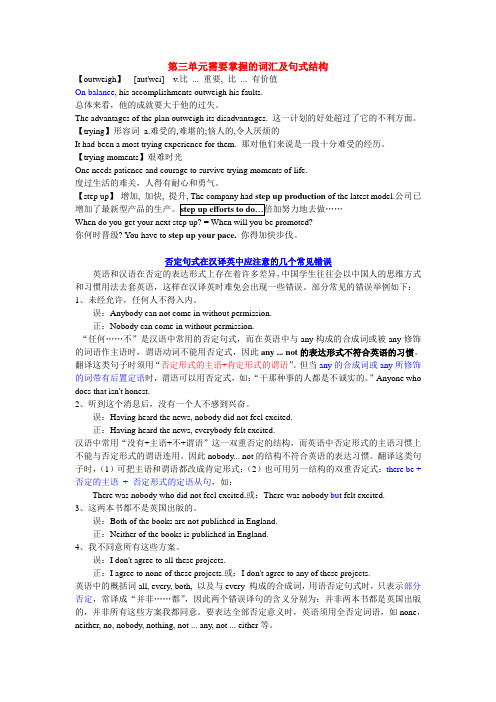
第三单元需要掌握的词汇及句式结构【outweigh】[aut'wei] v.比... 重要, 比... 有价值On balance, his accomplishments outweigh his faults.总体来看,他的成就要大于他的过失。
The advantages of the plan outweigh its disadvantages. 这一计划的好处超过了它的不利方面。
【trying】形容词a.难受的,难堪的;恼人的,令人厌烦的It had been a most trying experience for them. 那对他们来说是一段十分难受的经历。
【trying moments】艰难时光One needs patience and courage to survive trying moments of life.度过生活的难关,人得有耐心和勇气。
【step up】增加, 加快, 提升, The company had step up production of the latest model.公司已When do you get your next step up? = When will you be promoted?你何时晋级? You have to step up your pace.你得加快步伐。
否定句式在汉译英中应注意的几个常见错误英语和汉语在否定的表达形式上存在着许多差异,中国学生往往会以中国人的思维方式和习惯用法去套英语,这样在汉译英时难免会出现一些错误。
部分常见的错误举例如下:1、未经允许,任何人不得入内。
误:Anybody can not come in without permission.正:Nobody can come in without permission.“任何……不”是汉语中常用的否定句式,而在英语中与any构成的合成词或被any修饰的词语作主语时,谓语动词不能用否定式,因此any ... not的表达形式不符合英语的习惯。
Unit 03 A Dill Pickle 现代大学英语精读第三册第三单元 ppt课件

ignorant (adj.)
Many teenagers are surprisingly ignorant about current politics. (对某事一无所知)
All the time his business was failing, he kept his wife and family in blissful ignorance.(出于关爱而隐瞒真相)
for her “refreshing originality” and “sensitiveness to beauty”.
However, just as she won world fame, her health grew worse. She died of tuberculosis in 1923, when she was 35 years old.
2020/12/2
11
Part 2 (13-22) – comprehension
Did Vera enjoyed the afternoon at Kew Garden? Why or why not?
How do you understand paragraph 15? What does “that” refer to? And what does “his” refer to?
From paragraph 21 and paragraph 22, what conclusion can you draw about Vera’s views on the man?
2020/12/2
12
Part 2 (13-22) – appreciation
- 1、下载文档前请自行甄别文档内容的完整性,平台不提供额外的编辑、内容补充、找答案等附加服务。
- 2、"仅部分预览"的文档,不可在线预览部分如存在完整性等问题,可反馈申请退款(可完整预览的文档不适用该条件!)。
- 3、如文档侵犯您的权益,请联系客服反馈,我们会尽快为您处理(人工客服工作时间:9:00-18:30)。
Unit Three Evolution and Natural Selection[1]The idea of evolution* was known to some of the Greek philosophers. By the time of Aristotle①, speculation* had suggested that more perfect types had not only followed less perfect ones but actually had developed from them. But all this was guessing; no real evidence was forthcoming*. When, in modern times, the idea of evolution was revived*, it appeared in the writings of the philosophers – Bacon①, Descartes②, Leibniz③ and Kant④. Herbert Spencer① was preaching* a full evolutionary doctrine* in the years just before Darwin's② book was published, while most naturalists would have none of it. Nevertheless a few biologists ran counter to the prevailing* view, and pointed to such facts as the essential unity of structure in all warm-blooded animals.[2]The first complete theory was that of Lamarck①(1744~1829), who thought that modifications* due to environment, if constant and lasting, would be inherited and produce a new type. Though no evidence for such inheritance was available, the theory gave a working hypothesis* for naturalists to use, and many of the social and philanthropic* efforts of the nineteenth century were framed on the tacit* assumption that acquired improvements would be inherited.[3]But the man whose book gave both Darwin and Wallace the clue was the Reverend* Robert Malthus① (1766~1834),sometime curate* of Albury in Surrey. The English people were increasing rapidly, and Malthus argued that the human race tends to outrun its means of subsistence* unless the redundant* individuals are eliminated. This may not always be true, but Darwin writes:[4]In October 1838,I happened to read for amusement Malthus on Population, and being well prepared to appreciate the struggle for existence which everywhere goes on, from long continued observation of the habits of animals and plants, it at once struck* me that, under these circumstances, favorable variations* would tend to be preserved, and unfavorable ones to be destroyed. The result of this would be the formation of new species. Here then I had a theory by which to work.[5]Darwin spent twenty years collecting countless facts and making experiments on breeding* and variation in plants and animals. By 1844 he had convinced himself that species are not immutable*, but worked on to get further evidence. On 18 June 1858 he received from Alfred Russell Wallace a paper written in Ternate, in the space of three days after reading Malthus's book. Darwin saw at once that Wallace had hit upon the essence of his own theory. Lyell① and Hooker②arranged with the Linnaean③Society to read on July 1st 1858 Wallace's paper together with a letter from Darwin and an abstract* of his theory written in 1844.Then Darwin wrote out an account of his labors, and on 24th November 1859 published his great book The Origin of Species.[6]In any race of plants or animals, the individuals differ from each other in innate* qualities. Darwin offered no explanation of these variations, but merely accepted their existence. When the pressure of numbers or the competition for mates* is great, any variation in structure which is of use in the struggle has "survival value" and gives its possessor an improved chance of prolonging life and leaving offspring. That variation therefore tends to spread through the race by the elimination of those who do not possess it, and a new variety or even species may be established. As Huxley said, this idea was wholly unknown till 1858.Huxley① said the book was like a flash of lightning in the darkness. He wrote:It did the immense service of freeing us from the dilemma - Refuse to accept the Creation hypothesis, and what have you to propose that can be accepted by any cautious reasoner? In 1857 I had no answer ready, and I do not think anyone else hadA year later we reproached* ourselves with dullness for being perplexed* with such an enquiry. My reflection* when I first made myself master of the central idea of the Origin was " How extremely stupid not to have thought of that!"[7]The hypothesis of natural selection may not be a complete explanation, but it led to a greater thing than itself - an acceptance of the theory of organic* evolution, which the years have but confirmed. Yet at first some naturalists joined the opposition. To the many, who were unable to judge the biological evidence, the effect of the theory of evolution seemed incredible as well as devastating*, to run counter to common sense and to overwhelm* all philosophic and religious landmarks. Even educated man, choosing between the Book of Genesis and the Origin of Species, proclaimed* with Disraeli① that he was "on the side of the Angels".[8]Darwin himself took a modest view. While thinking that natural selection was the chief cause of evolution, he did not exclude Lamarck's idea that characters acquired by long use or disuse might be inherited, though no evidence seemed to be forthcoming. But about 1890 Weismann①drew a sharp distinction between the body (or soma) and the germ cells which it contains. Somatic cells can only reproduce cells like themselves, but germ* cells give rise not only to the germ cells of a new individual but to all the many types of cell in his body. Germ cellsdescend from germ cells in a pure line of germ plasm,but somatic cells trace their origin to germ cells. From this point of view, the body of each individual is an unimportant by-product of his parents’ ger m cells. The body dies, leaving no offspring, but the germ plasms show an unbroken continuity. The products of the germ cells are not likely to be affected by changes in the body. So Weismann's doctrine offered an explanation of the apparent noninheritance of acquired characters.[9]The supporters of pure Darwinism came to regard the minute variations as enough to explain natural selection and natural selection enough to explain evolution. But animal breeders and horticulturists* knew that sudden large mutations* occur, especially after crossing, and that new varieties might be established at once. Then in 1900 forgotten work by Mendel①was rediscovered and a new chapter opened.[10]In 1869 Darwin's cousin, Francis Galton①, applied these principles to mental qualities. By searching books of reference, Galton examined the inheritance of ability. For instance, he found that the chance of the son of a judge showing great ability was about 500 times as high as that of a man taken at random, and for the judge's father it was nearly as much. While no prediction can be made about individuals, on the average of large numbers, the inheritance of ability is certain.Ⅰ. ComprehensionAnswer the following questions or complete the following statements by choosing the best alternative A, B, C or D under each. You are allowed 2 minutes 30 seconds for this part.1. From para.[1],it may be inferred that _______.A.philosophers were more sensitive than naturalistsB.Darwin's idea was based on Spencer'sC.the essential unity of structure in animals may prompt speculations about evolutionD.the prevailing view refers to Darwin's evolution2. Which of the following is not true?marck was one of the first scientists to attempt an explanation for the causes ofevolution.B.According to Lamarck, athletes develop their muscles by constant exercise and themuscular athlete will produce offspring whose muscles are well developed.marck's theory seemed reasonable.marck's theory was fully accepted by naturalists.3. Malthus's population theory _______.A.was the origin of Darwin's idea of evolutionB.was established from observation of the habits of animals and plantsC.stimulated Darwin's idea of natural selectionD.convinced Darwin that evolution has occurred4. Para.[5]suggests all the following except ______.A.Darwin was a methodical manB.Wallace was as impulsive as Darwin was deliberateC.Wallace found Darwin's work after many yearsD.Darwin's painstaking effort to document his views would have been extendedconsiderably but for the work of Wallace.5. Para.[6]mainly explained ______.A.the source of variationB.the idea of natural selectionC.the difference between favorable plants and animals and unfavorable onesD. the competition of animals6. Huxley ______.A.was reluctant to accept the Creation hypothesis but couldn’t offer another satisfyinganswer to the problemB.fully accepted Darwin’s ideaC.thought Darwin’s natural selection was a very simple ideaD.all of the above7. Which of the following is most likely to be the main reason why the public opposed Darwin’s theory?A.They lacked knowledge of biology.B.They were disturbed by gaps in the theory.C.The idea that humans developed from some subhuman creature outraged them.D.They found the evidence for the theory not convincing.8. What is the main idea of the last three paragraphs?A.Darwin’s theory of evolution was out of date.B.The conflict between Darwinism and anti-Darwinism.C.Strong objections were expressed against Darwin’s concept of organic evolution.D.There were weaknesses in Darwin’s theory and new theories were forming.9. What was not explained by Darwin?A.Variation within a species is common.B.New species can develop, either in one generation or gradually over many generations.C.New species may arise from former ones.anisms that are best suited to adapt to environmental changes will survive.Ⅱ. VocabularyA. Identify one of the four choices A, B, C, or D which would keep the meaning of the underlined word or phrase.1. Henry Ⅵ was an overwhelming success, perhaps partially because Shakespeare drew characters from actual English history.A. greatB. AmazedC. unexpectedD. unbelievable2. The new communication system is by no means a minute invention.A. insignificantB. minusculeC. accidentalD. significant3. On the notice board there was a list of forthcoming events at school.A. excitingB. arisingC. warningD. approaching4. In the Pacific Northwest, as climate and topography vary, so do the species that prevail in the forests.A. coexistB. invadeC. dominateD. gather5. Behind him were the ruins of a city, shattered, devastated, crumbled piles of concrete and stone that glowed.A. burntB. ravagedC. isolatedD. conquered6. Revision of technical prose requires word by word review and elimination of whatever is redundant.A. talkativeB. profuseC. abundantD. wordy7. In the last chapter I proposed the hypothesis that a pure poetry-exists, employing the term "lyric“ to describe poems which "consist of poetry and nothing else".A. conjectureB. deductionC. inferenceD. supposition8. Tacit parental approval should be obtained before marriage.A. tactfulB. permissiveC. intactD. implicit9. Then he sat and thought in the concentrated, abstracted way he has almost forgetting my presence.A. preoccupiedB. observantC. intentD. careful10. An Alexandrian speculator finally thought of a way of turning cat mummies into money.A. spectatorB. observerC. businessmanD. magicianB. Choose the correct answer. Only one answer is correct.11. These demands _____ the agreements we have reached.A. run away fromB. go against toC. go counter toD. act counter from12. Mary’s _____ was whether to go to the party in her old dress or to stay at home.A. plightB. emergencyC. dilemmaD. jam13. In temperate regions the growth rings on turtles’ epidermal plates ____ seasonal variations in growth.A. stimulateB. reflectC. includeD. prevent14. When new math was introduced into schools, many parents were _____ by the approach it involved.A. interestedB. enjoyedC. perplexedD. informed15. Most of the great European thinkers of the eighteenth and early nineteenth centuries helped to _____ the conception Shaftesbury first formulated.A. developB. involveC. discoverD. grow16. It is unfair for the manager to ____ the typist for being late, because she has been ill for a week.A. adviseB. reproachC. reviveD. strike17. A vast cigar-shaped body of gas was raised and eventually _____ from the surface of the sun.A. descendedB. outrunC. abstractedD. reflected18. What a coincidence! It _____ me only this very morning that we hadn't seen each other for twenty years.A. hit onB. struckC. reproachedD. reflected on19. Many people mistake a familiar for a vulgar style, and suppose that to write without affectation is to write _____.A. overwhelminglyB. at randomC. in the abstractD. cautiously20. His opinions were _____ and easily influenced by anyone who had any powers of persuasion.A. reflectiveB. speculativeC. strikingD. startlingⅣ. TranslationA. Put the following into Chinese.If one considers the enormous variety of courses offered, it is not hard to see how difficult it is for a student to select the course most suited to his interests and abilities. If a student goes to university to acquire a broader perspective of life, to enlarge his ideas and to learn to think for himself, he will undoubtedly benefit. School often has too restricting atmosphere, with its timetable and disciplines, to allow him much time for independent assessment of the work he is asked to do. Most s tudents would, I believe, profit by a year or so’s exploration of different academic studies, especially those “all-rounders” with no particular interest.B. Put the following into English.1. 聪明的动物依情况或环境的需要而改变自己的行为,但人类能有意识地改变自己的行为。
